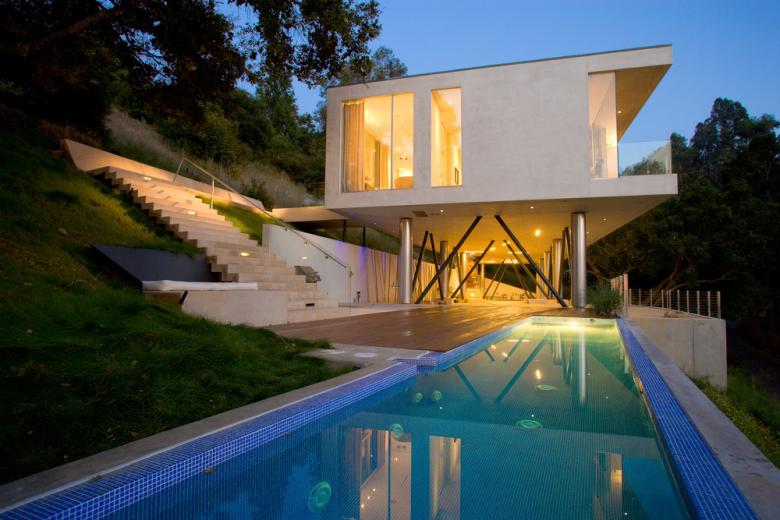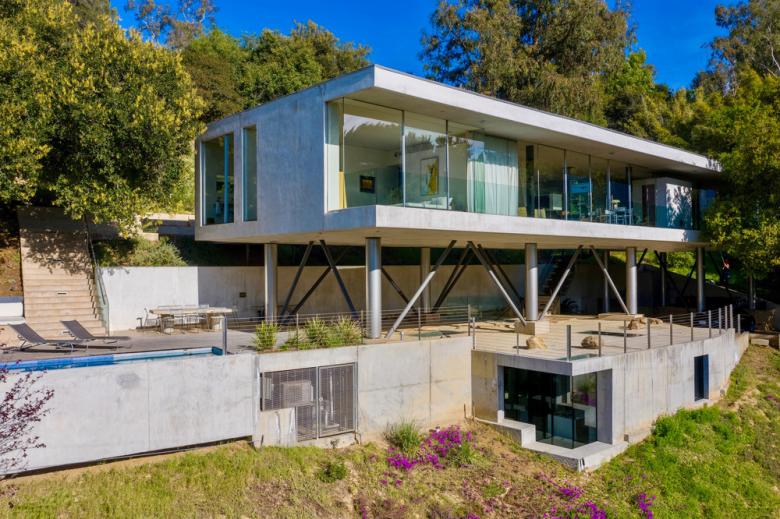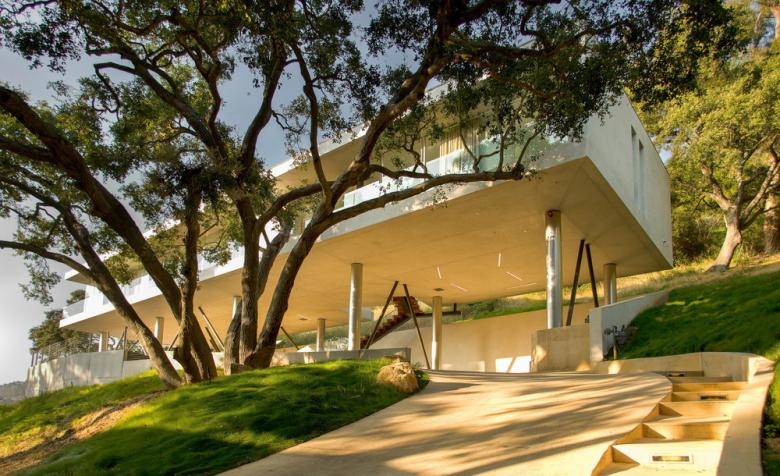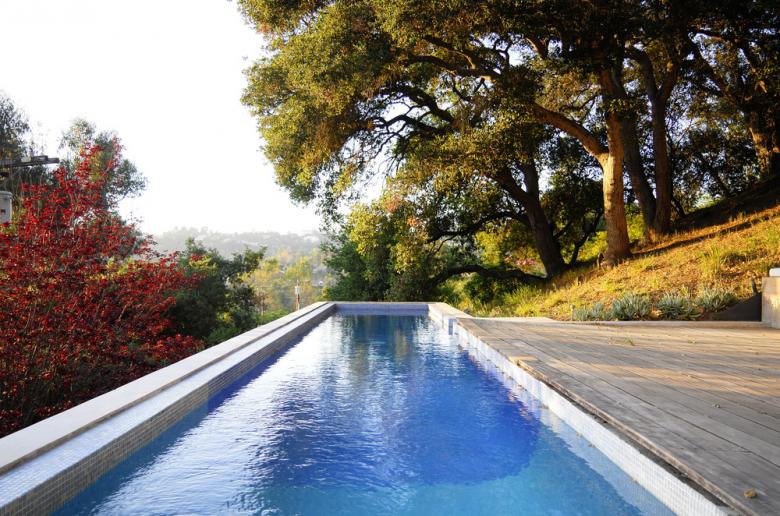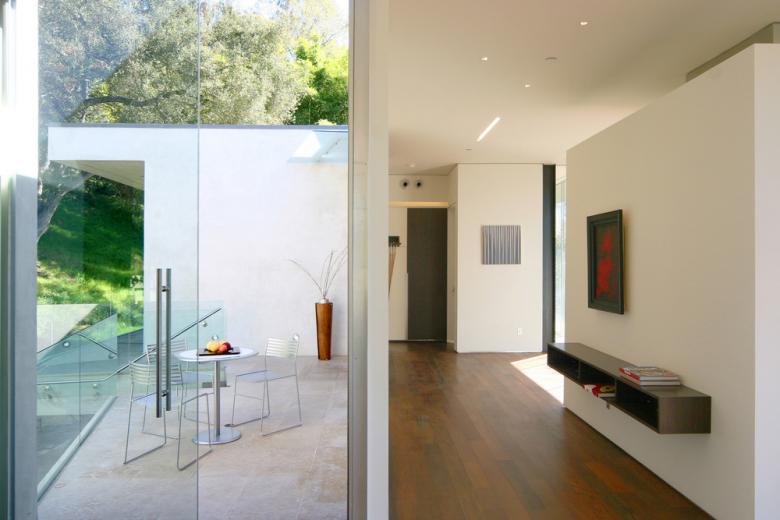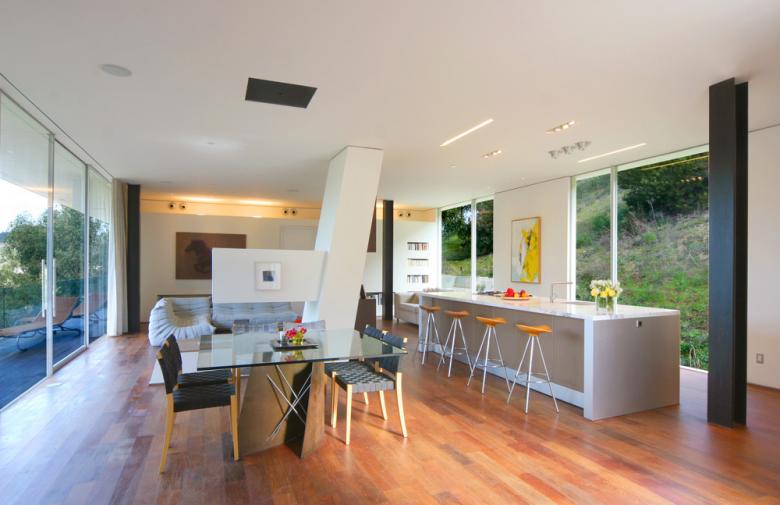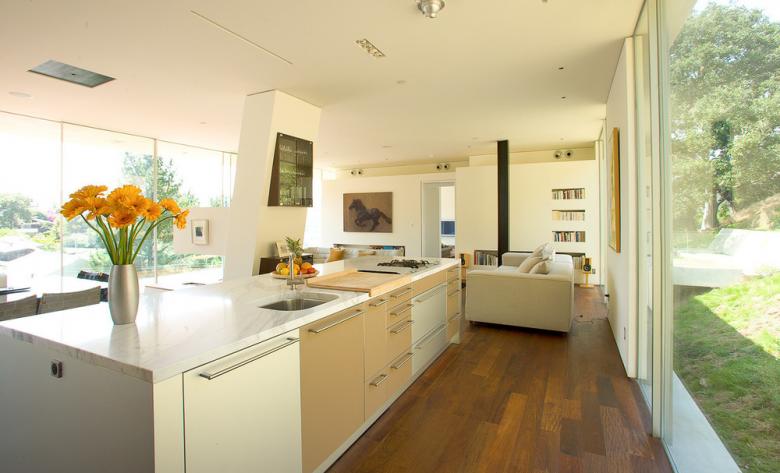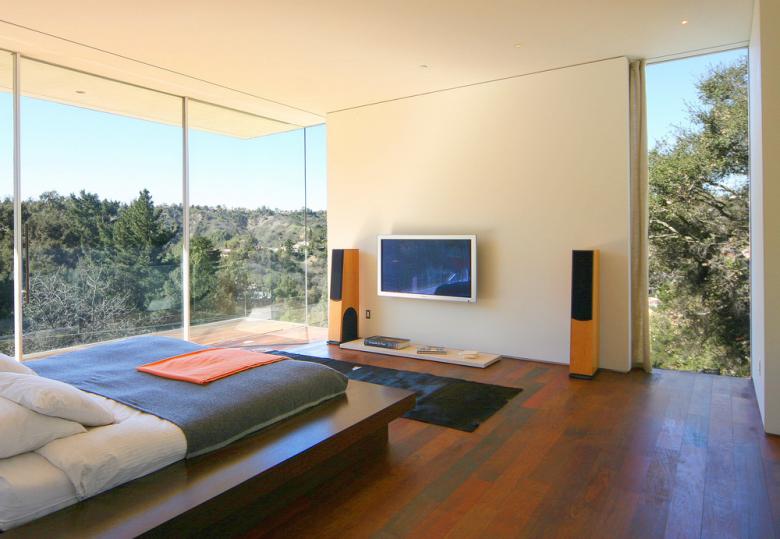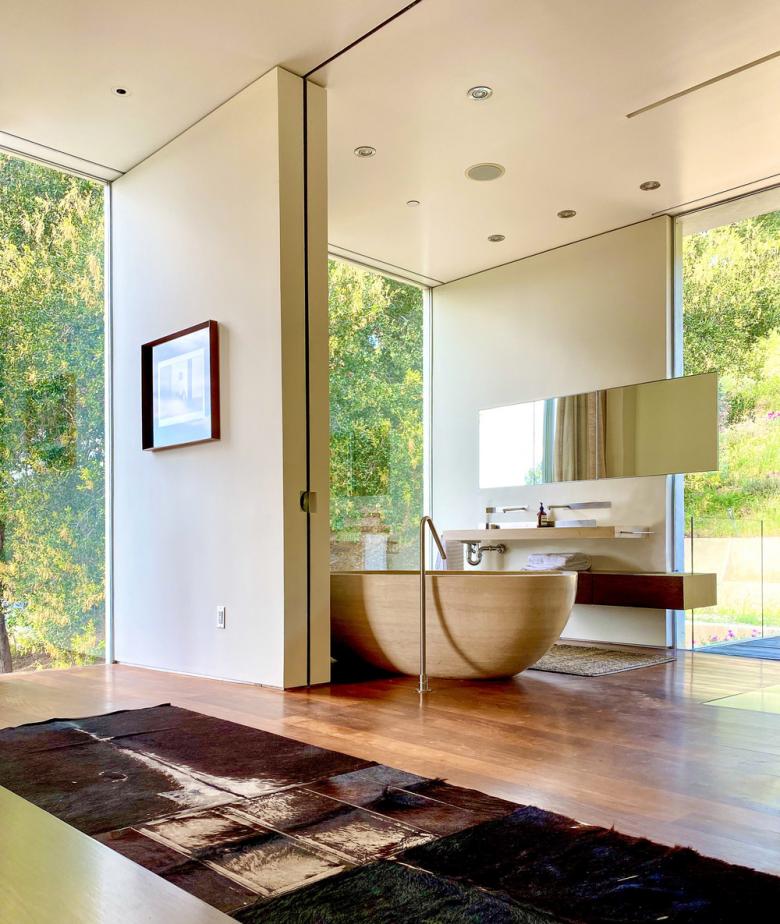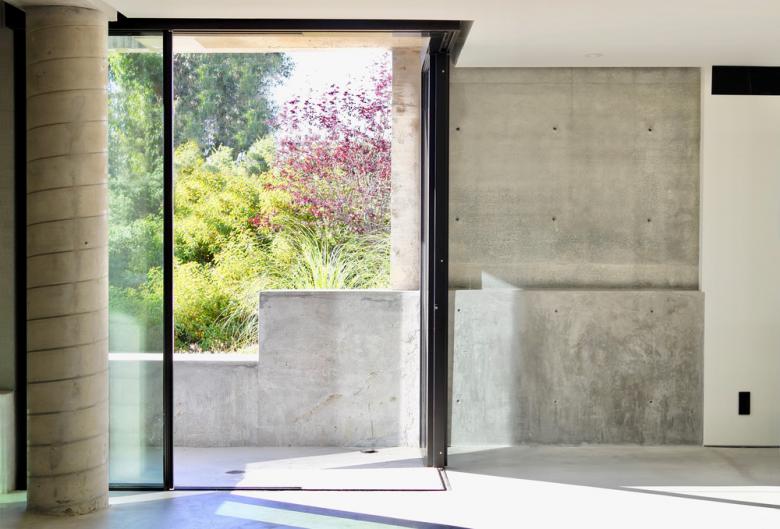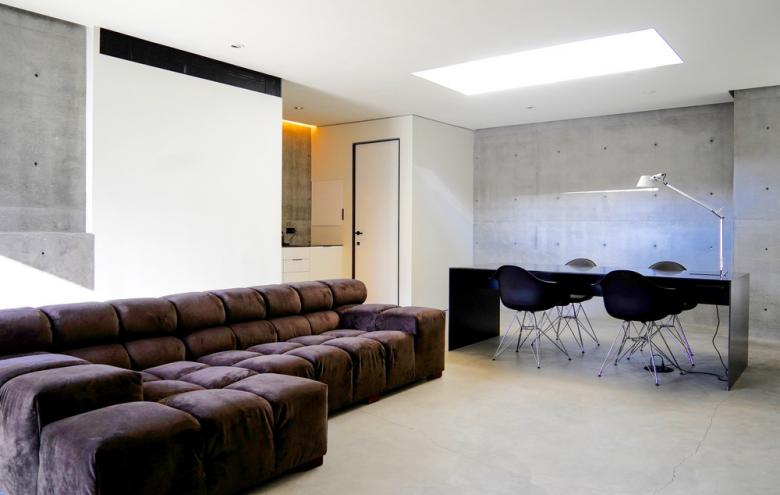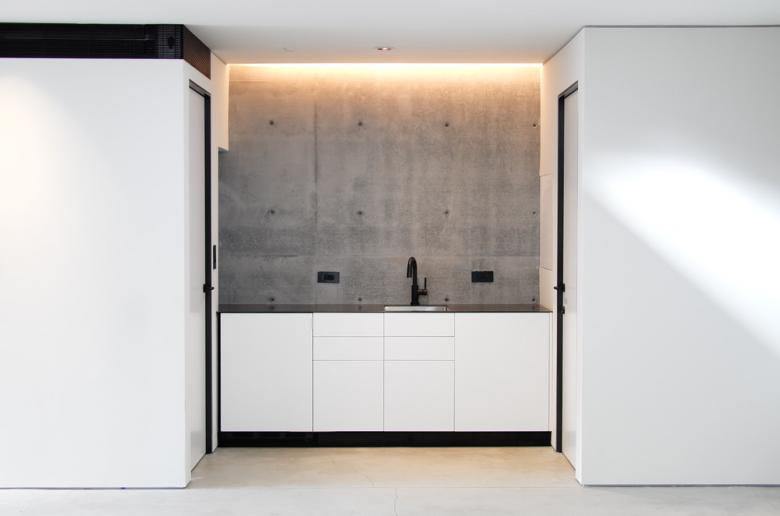Oak Pass Residence Addition
Heusch Inc
2. décembre 2020
Photo: Federico Zignani (All images courtesy of v2com)
Gerhard Heusch, founder of Heusch Inc. has unveiled a 1,500-sf underground office addition to his innovative Oak Pass residence in Beverly Hills, California.
Location: Los Angeles, California
Client: Gerhard Heusch
Architect: Heusch Inc
Contractor: Owner/builder
Concrete Contractor: Toltec Concrete
Floor Area: 1,500 sf
Photo: Gerhard Heusch
The office space continues to advance the innovative design solutions employed by the architect in building his 3,500-sf home, completed in 2006 on an empty parcel of abundantly natural land overlooking Benedict Canyon.
The additional office space succeeds in integrating into its surroundings without disrupting the architectural balance between the fully-built house and the natural beauty of the land, following in step with Heusch’s overall vision for the property.
Photo: Gerhard Heusch
Supporting the designHeusch’s architectural concept began to unfold in 2000 when he purchased an acre of breathtaking land that he was determined to blend his design into. With a landscaped hillside to the east and panoramic views of Benedict canyon to the west, he embarked on a project to balance his new residence with nature.
The plan he put forward was to build 10 steel columns to support an elevated house, which he successfully argued would mitigate any landslide threats to the built environment. The innovative solution allowed him to forgo the 15-foot setback by building a much smaller, less obtrusive retaining wall into a natural cut in the property. The design plan provided a platform that would enable him to build his spacious, modernist home into the treeline of the embracing hillside.
Photo: Gerhard Heusch
A minimalist treehouseWith 10-foot ceilings and floor-to-ceiling windows, Heusch’s open floor plan ensures that every room of the seamlessly flowing living space has a spectacular view. To further ensure unobstructed flow, Heusch embedded much of the house’s infrastructure, including roof drainage, plumbing, and electricity, into the support columns. As a result, upon entering the front door, unobstructed views carry through to a glass wall at the rear of the house, revealing a beautiful oak tree backdrop that emphasizes the seamless connection between the natural surroundings and his built environment.
Photo: Gerhard Heusch
The interior of the single-level layout is framed by natural stucco walls and Brazilian walnut floors, with custom-designed furniture, cabinets, fittings, and profiles that further embody Heusch’s minimalist vision. There are three bedrooms, including two guest bedrooms that can be linked together courtesy of a sliding wall. Spanish marble anoints the guest bathrooms, while the master bathroom is accented by Portuguese limestone, including a soaking tub that was hand-carved from a single block.
In order to accommodate an additional regulation requiring a second exit, based on the home’s total floor space, Heusch made another innovative architectural tweak. To meet the requirement, he built a small bridge and staircase exiting the elevated master bedroom, which leads down from the hillside to a pool area and adjacent Zen-style garden.
Photo: Gerhard Heusch
The daily commuteAfter completing the house in 2006, Heusch spent the next few years living in Argentina, where he was commissioned to work on a hotel project. After returning to California in 2010, he found that his heart lay with the idea of working from the same inspirational environment that he was living in. It was time to build his new office, with a fresh underground design that wouldn’t disturb his floating treehouse.
Photo: Frederico Zignani
Heusch decided that he would build his office beneath the pad of the Zen-like garden, a process which began with the excavation of 80 truckloads of dirt in front of the retaining wall. The adjacent pool area was left completely intact, and he carefully avoided disturbances to the main support columns of the house. However, in the end, one of the existing support columns was incorporated. With the help of a local sub-contractor, Heusch erected the walls of the concrete structure, welding custom fixtures to the rebar reinforcements before pouring the cement in order to accommodate electrical and other wiring needs as he had done for the house. He cut a window out of the existing retaining wall, as well as an entrance in a new concrete wall. To descend from the main entrance into the office space, he built a staircase, with its cantilevered treads also welded to the rebar. Once the structure was built, Heusch sealed the space with a concrete ceiling. He then reintroduced the sand and pavers of the former garden space above and added strategically-placed boulders extracted from the dig, as well as two panels of new glass flooring.
Photo: Frederico Zignani
Heusch had achieved his goal of creating 1,500 sq. ft. of underground, yet naturally-lit, office space.
Completed in 2017, the office addition took Heusch 10 months to build and has renewed international attention to an architectural project that innovates at every turn. At a point in history when the delicate balance between nature and the built environment has exponentially grown in importance, Heusch’s Oak Pass aesthetic and structural innovation has garnered tremendous interest from architectural circles as a model for future projects.
